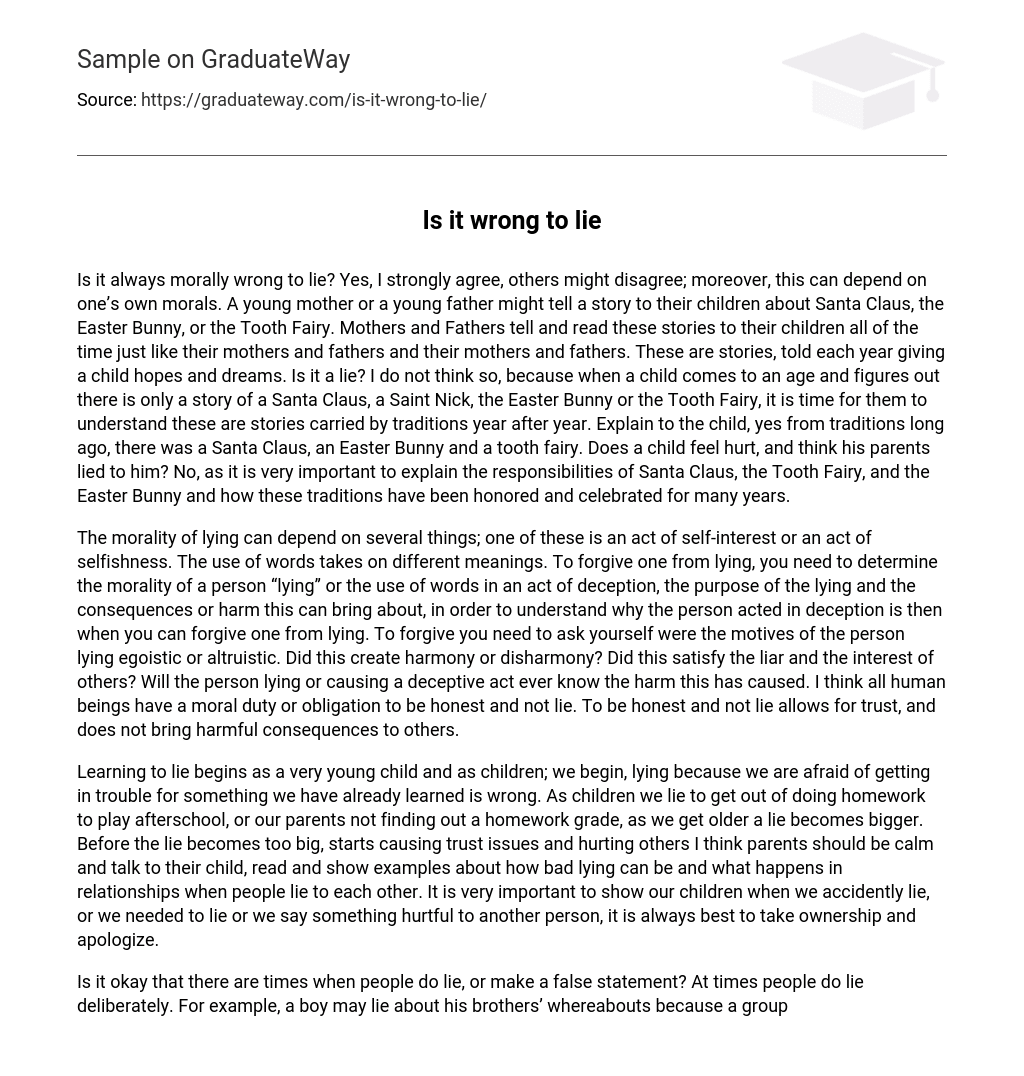The subjective nature of lying and its morality can vary depending on personal beliefs. For instance, parents often recount tales of Santa Claus, the Easter Bunny, and the Tooth Fairy to their children. These stories have been passed down through generations to foster hope and imagination in kids. While some may argue that sharing these stories is being deceitful, I hold a different opinion. It is essential for parents to later clarify the origins of these stories and their historical significance when children realize that these characters are not real. This aids children in understanding the traditions associated with Santa Claus, the Tooth Fairy, and the Easter Bunny rather than feeling betrayed or hurt by their parents.
The morality of lying can vary depending on factors such as self-interest or selfishness. Language usage carries diverse meanings. To forgive someone for lying, we must evaluate their moral character and the motivations behind their deception, as well as the potential harm it may cause. Understanding these factors leads to forgiveness. Important considerations include whether the lying originated from egoism or altruism, its impact on harmony or disharmony, and whether it served both the liar’s interests and those of others. It remains uncertain if the liar will ever fully comprehend the harm caused. In my opinion, all individuals have a moral obligation to be truthful and refrain from lying. Honesty fosters trust and prevents negative consequences for others.
The process of learning to deceive starts early in life, as children begin fabricating falsehoods due to the fear of facing consequences. In the beginning, they may lie so they can enjoy playtime instead of doing homework or hide a poor grade from their parents. Nevertheless, as they grow older, their lies become more significant. To prevent these lies from escalating and causing harm by damaging trust, parents should calmly address and have a conversation with their child about this issue. It is crucial for parents to exemplify and discuss the negative repercussions lying has on relationships. Additionally, it is important to teach children the value of taking responsibility and offering apologies when unintentionally misleading others or uttering hurtful words.
Are people allowed to lie or make false statements? Yes, there are instances when individuals intentionally deceive. For example, a boy may fabricate a story about his brother’s whereabouts in order to protect him from a group of boys. Similarly, a doctor might provide false optimism to a patient with only three months left to live. In certain scenarios, being truthful may conflict with values such as compassion and respect, particularly when the objective is to prevent harm or offer encouragement. Occasionally, offering hope has the potential to save the life of someone who is terminally ill or allow for resolution of an issue involving bullies and parental intervention. Participating in this kind of deception does not harm relationships or families that are built on trust.
When considering the ethics of lying, one can argue that it becomes morally unacceptable when done self-centeredly and causing harm to another individual. In such instances, it can be deduced that lying is indeed ethically wrong, especially if it leads to physical or financial harm for someone else. Conversely, by employing inductive reasoning and examining particular cases where individuals lie about others resulting in harm, it can be generally inferred that lying is morally incorrect.
I adhere to two principles that were taught to me early in life. The initial principle is to treat others the way I want to be treated, and the second principle is to avoid speaking if I have nothing kind to say.
In society, lying is thriving in times of social uncertainty. From my past job experience with clients, I learned that people cannot be trusted. They will say anything to safeguard themselves. Working in an office environment where I interacted with people daily, facing constant criticism, and placing trust in these individuals because they claim to assist you, only to later discover their self-serving intentions, deeply crushes your spirit.
Every day, I reflect on how our Father in Heaven would behave and treat others. I contemplate whether he would engage in gossip or tell lies about certain individuals, or if he would defend someone in an argument.
While it is acceptable to inform unpleasant boys or young children about certain things like Santa Claus, deceiving others by falsifying your resume ultimately harms yourself. Lying becomes ethically problematic when it negatively affects someone’s financial security, social standing, physical well-being, or emotional state.





